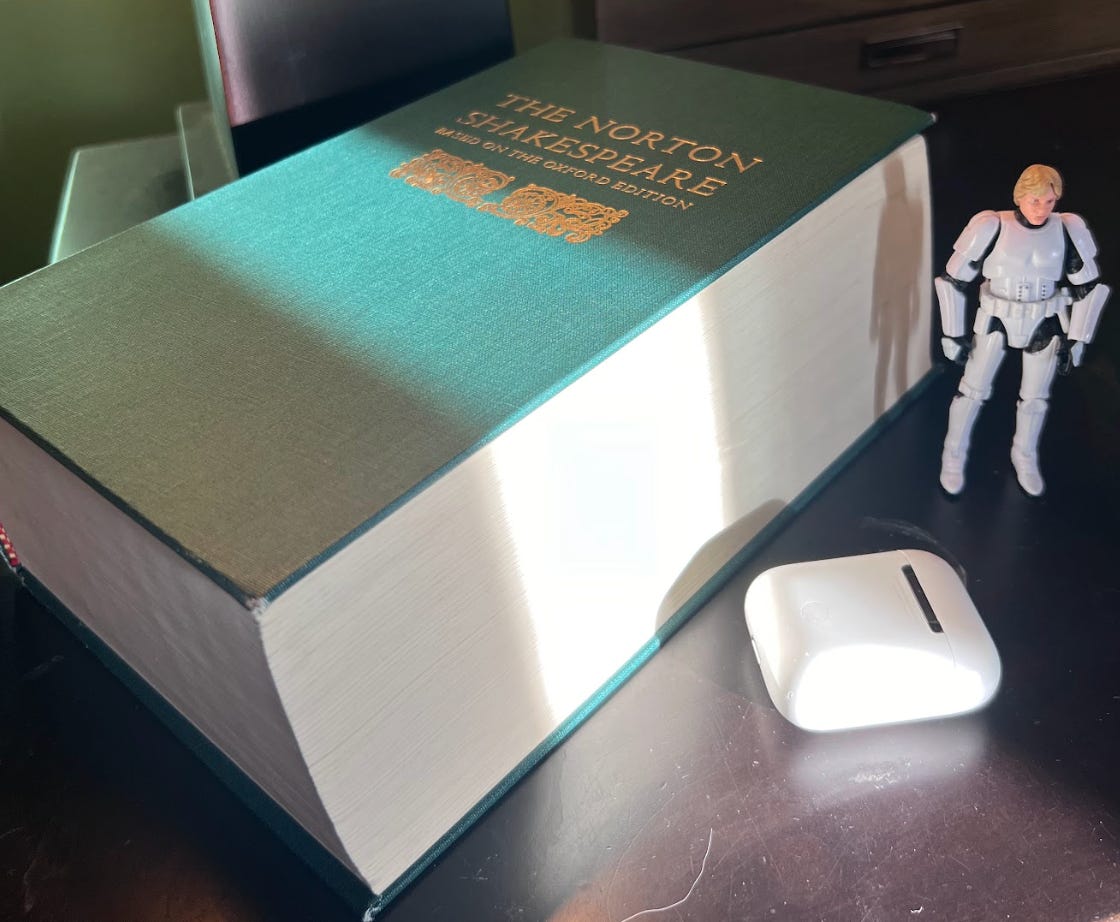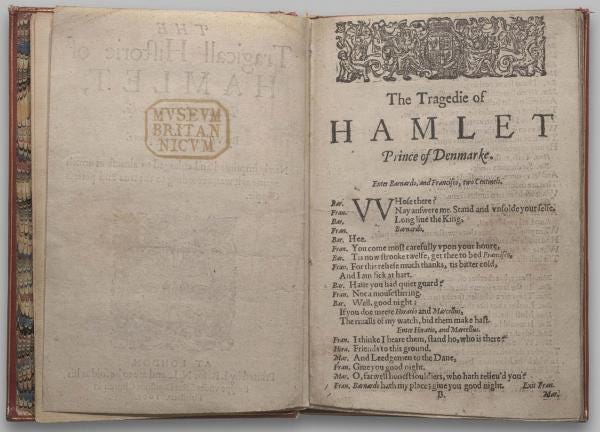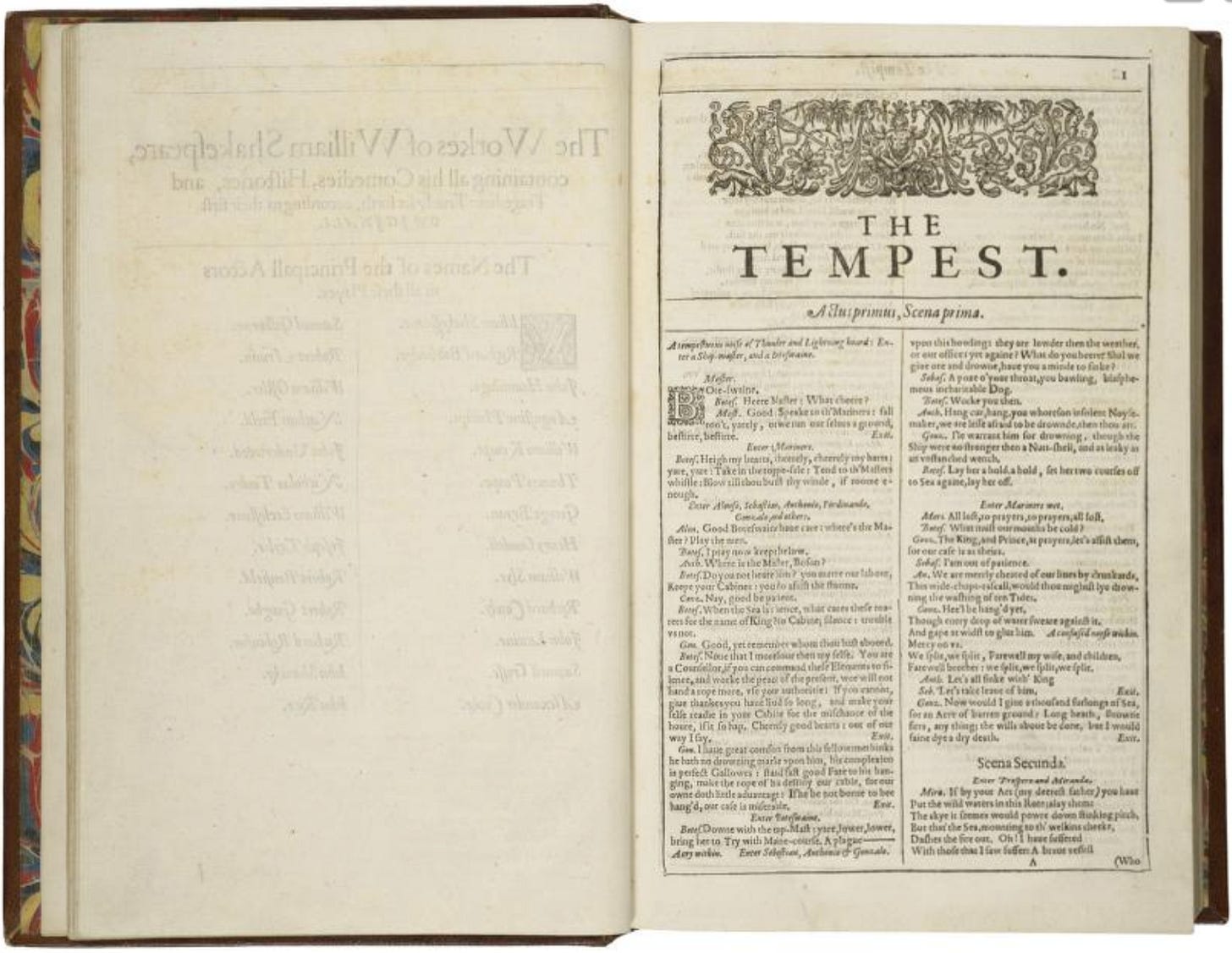Reading Every Shakespeare Play in 2024
And discovering mystery after mystery about the guy
Sometime last year, I changed my reading habits. I needed an approach that worked with my schedule and my energy level. So I gave myself the grace and freedom to not finish a book.
It worked for a while. Pick up a title, take in a few pages or chapters, then walk away. Read, rinse, repeat. It was refreshing—and a great way to revisit parts of stories I love. My bookshelf didn’t feel stale.
But that method stopped working.
With the dawn of the new year, I decided I needed focus. I needed the reading experience to feel complete.
Then came the big idea. If I have Shakespeare’s likeness tattooed on my arm, then I better be ready to speak to his work. I thought, it’s time for a deep dive.
Enter the Norton Shakespeare anthology.
3,400+ pages. Every play. Every sonnet. And enough footnotes, anecdotes, citations, synopses, and editorial commentary to crack the lenses of my glasses.
But so far, it’s been nothing but surprises.
I purchased the Norton anthology back in Iowa when I took a Shakespeare course. The book didn’t get it’s due from the 19-year-old me. Let’s just say I underperformed.
I took the class again a few years later (by choice, and this time with friends) and got much more from it—and a better grade.
But I still left feeling as though I hadn’t really scratched the surface. The college version of myself didn’t have the discipline. I was still just a tourist in Shakespeare.
But the inkling of interest was there through the years.
I played Friar Lawrence in Romeo and Juliet in high school—a role I still hope to reprise someday. He’s the most interesting character in the play, if you ask me. He could have saved them. They trusted him. He didn’t see the risks, and/or he was blinded by their love. And maybe, just maybe, he lived for the excitement of something forbidden—a feeling he’d never personally experience as a member of the clergy.
I don’t have a picture handy of me onstage at age 17, so I turned to artifical intelligence to help.
I also loved Hamlet, a paperback I carried with me and read on the Metro as an intern in D.C. And on the screen, I was taken with incredible performances by actors in As You Like It and Merchant of Venice. Additionally, I recently re-read and enjoyed MacBeth after missing a question about it in pub trivia.
So in late December, I made the decision. I was going to read the Norton Anthology of Shakespeare, cover to cover in 2024.
Well, I can’t say it’s going great.
I’m on pace to wind up about 700 pages short. But I’m counting on some weekends and vacations to make up some ground. It’s the added text of editor commentary that is really killing me, but also incredibly interesting.
The first 75 pages or so was Shakespearean biographical information as well as a glimpse into 16th- and 17th-century England. So many of Shakespeare’s works bear marks of the times, and I would miss so many of them if I didn’t cover this territory.
Then, I started in on the plays. The text is based on the Oxford Shakespeare, which itself is based on the first folio of 1623.
I’m three plays in. The Norton anthology goes in chronological order. But here’s the thing: we don’t know the real order in which Shakespeare wrote plays.
In fact, there’s a lot about Shakespeare we don’t know. We actually don’t even have a surviving scrap of paper of his writing. The only undisputed handwriting we have is just a couple of signatures on minor legal documents.
To make matters more complicated, it appears that he never advocated for putting his plays in print. Scholars agree that he died a retired, wealthy playwright who didn’t bother with his legacy.
A couple plays were printed during his lifetime, but it was unlikely he was behind it. Actors would look for a little side money, so they’d make a deal with a printer to print an unauthorized version of the play. Often times, the actor would work from memory. These plays are printed in a form called “quarto.”
Then, seven years after Shakespeare’s death, a group of those close to him committed a good selection of his plays to paper. That’s the first folio. This was the first good attempt at preserving the work. However, an interesting thing happened.
The first folio versions were different than some of the unauthorized versions. And some plays existed in two versions. 2 Hamlets. The Taming of the Shrew and The Taming of a Shrew. Character names differed. Sometimes entire passages.
Scholars agree that Shakespeare likely believed plays were meant to be watched, not read. And I’ll admit. Reading is interesting, and I love it. But when I see a performance, the actors bring the characters to life in ways my mind doesn’t.
And those same scholars assert that there was probably some communal input on many of Shakespeare’s plays, simply due to the nature of the creative process while rehearsing and performing the play.
In fact, I was fascinated to find this out: 400 years ago, the leading man in Shakespeare’s company made the choice to fall out of his chair when he saw Hamlet’s father’s ghost. To this day, some Hamlet portrayers still perform the stunt. It’s nowhere in a script.
As of this writing, I’ve read Two Gentlemen of Verona and Taming of the Shrew. I’m into act two of the historical drama Henry the VI Part II, which is proving a harder read. But hopefully by the time you see this, dear reader, I’m done with that one.
All three plays wear the marks of a writer who is less mature and hasn’t found the voice heard in Romeo and Juliet, Hamlet, or Midsummer Night’s Dream. The first two plays I read are certainly problematic at best, given our modern standards.
In Two Gentlemen, one of the “gentlemen” lies over and over to his best friend in order to steal his girlfriend, then threatens sexual assault, only to be promptly forgiven by his bro. The offender’s girlfriend then takes him back fairly willingly.
Taming of the Shrew has some charming moments. But really at its heart, it’s about how to subdue your opinionated girlfriend. Everyone, even the “good” guys, lie their pants off all the time in this one. That part is kinda funny.
But one of the main characters starves his wife and doesn’t let her sleep for days until she chills out. And it works! This isn’t what I hope for in a husband for my daughters. But this is a comedy from a different era. I’m not here to take it literally. But still. Yikes.
All told, I’m enjoying myself so far.
But taking a step back, the point is this: I’ve found my way in reading again. It’s hard to say how I got lost in the first place. How do any of us get lost loving things we love? Repetition? The passage of time? Waking up one day and realizing that what you’ve always done doesn’t seem to do it for you any more?
Do I realize that I may not make it to the end before December 31 this year? Yes I do. Do I care? Me thinks not.
For as the eye doth rest on pleasing words, the mind will rest upon the turning page.
I made that up. Not sure what it means. But note the iambic pentameter.







